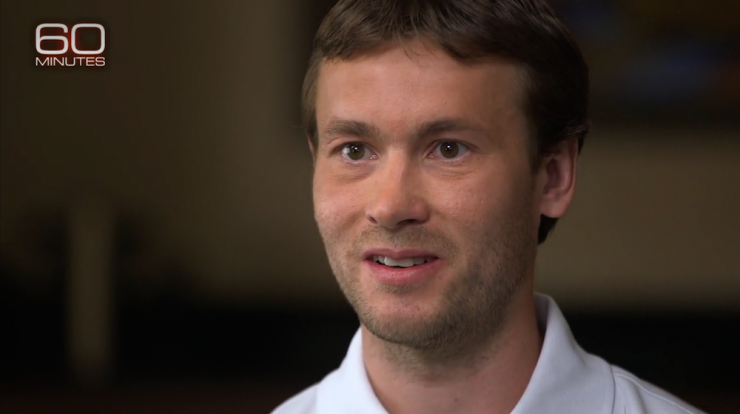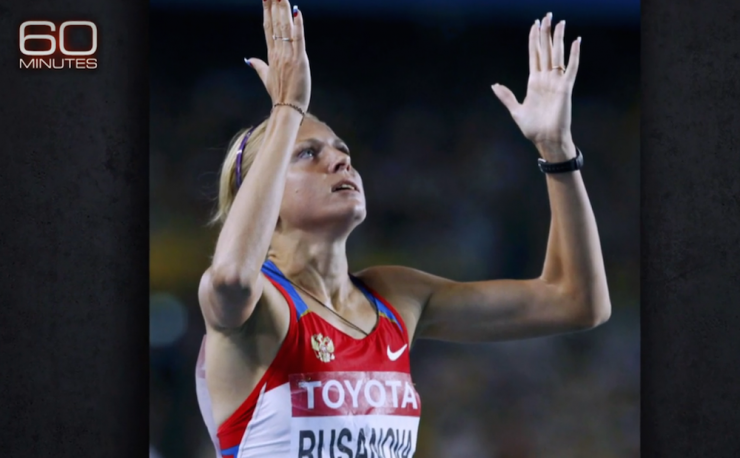
At least four Russian gold medalists in Sochi used performance-enhancing drugs to reach the top of the podium at the last Winter Olympics, and the FSB — Russia’s equivalent of the FBI — helped with the cover-up.
That’s the story that was told to 60 Minutes, which aired Sunday evening in the form of a 13-minute interview with Vitaly and Yuliya Stepanov, as well as U.S. Anti-Doping Agency CEO Travis Tygart and American runner Alysia Montaño.
Yuliya Stepanov was one of Russia’s top runners in track and field — a program the World Anti-Doping Agency (WADA) suspended in November after its independent investigation found it was engrossed in a “culture of cheating” and widespread corruption. Yuliya’s husband, Vitaly, previously worked at what the 60 Minutes described as “a low-level job collecting urine and blood samples” for RUSADA, the Russian Anti-Doping Agency, in Moscow.
“Together, they exposed the dark secrets of their country’s doping program and, as you will learn for the first time, damning new details about cheating at the 2014 Winter Games in Sochi, Russia,” the news segment stated.

Yuliya doped and all of her teammates doped, she stated. Vitaly didn’t agree with it, asserting that he wanted sports to be fair and clean. The two decided to get divorced, Vitaly lost his job, yet they would later reunite under a common cause.
Just before the 2012 London Games, Yuliya — who was no longer a medal contender — “lost the protection of the system and tested positive for EPO,” the segment stated. “Facing a two-year ban, she called Vitaly just days before their divorce would be final.”
“And he suggested, ‘Let’s tell the truth, Let people know the whole truth, the way things happen in Russia,’ ” Yuliya said. “To destroy the system one has to talk about it.”
Yuliya used her phone to secretly video her coach giving her steroids, her teammates discussing their drug use and the team’s medical director telling her how to get back on the drug program. The video recordings were used in a documentary by Germany’s ARD, which aired in December 2014 and prompted WADA to take action — banning the Russian track and field team as a result.
The couple now lives in a one-bedroom apartment with their child at an undisclosed location in the U.S. — 60 Minutes did not say where for their protection.
Over the last few months, Grigory Rodchenkov (who ran the drug-testing lab in Sochi, was fired following the WADA investigation and has also sought refuge in the U.S.) shared what he knew with Vitaly. Apparently, Rodchenkov was unaware that Vitaly recorded 15 hours of their conversations, and “what Rodchenkov has revealed threatens the credibility of the results at the 2014 Winter Games in Sochi, Russia,” 60 Minutes reported.
“What Rodchenkov has revealed threatens the credibility of the results at the 2014 Winter Games in Sochi, Russia.”
“He told me what I and Yulia did, we could only see this much. But what was happening with cover-ups, it’s like this,” Vitaly said, holding his hands out wide.
Rodchenkov apparently bragged that he had what he called “the Sochi list” of Russians who used prohibited substances at the 2014 Winter Games. What’s more: Russia’s FSB, its federal security service, was directly involved.
Vitaly said that, according to Rodchenkov, some FSB agents worked as doping-control officers at the Sochi Olympics and “tried to control every single step of the anti-doping process in Sochi.”
Rodchenkov also said at least four Russian athletes won gold medals in Sochi while using banned drugs, and his lab aided the cover-up. He did not specifically name the athletes, but speculation surrounds a list of 26 Russian gold medalists from 13 events in Sochi, with some athletes earning more than one gold. A representative for Rodchenkov told 60 Minutes that, for now, he was not available for comment.
“It’s a stunning revelation,” USADA’s Travis Tygart said. “And if true it’s a devastating blow to the Olympic values.”
In the next month, the governing body of track and field will decide whether it will allow the Russian team to compete at the Rio Olympics this summer.
“It’s clearly the final nail in the coffin for Russian track and field,” Tygart said. He said USADA is not in favor of allowing Russia to compete in track and field in Rio.
US Biathlon President and CEO Max Cobb reacted on Twitter Sunday evening, posing a few questions: “… How, after over 200 emails on the corruption, did #WADA designate the Moscow lab for Sochi?”
Cobb followed up with a series of other tweets and retweets regarding the interview.
“2. Why is it that @CBSNews, @ARD_Presse & London papers are investigating & validating what Pound suspected, while #WADA does nothing?” and “3. Verification of heretofore suspected widespread doping & coverup at Sochi has HUGE impact & demands immediate investigation by #WADA”
“With brave whistleblowing by Stepanovs & Rodchenkov’s statements, time for #WADA to investigate Sochi & all sports in RUS. If not now, when?” Cobb added.
“Thank you @60Minutes for bring this harsh reality to the masses. Heartbreaking and infuriating!” US Biathlon A-team member Lowell Bailey tweeted Monday morning.



